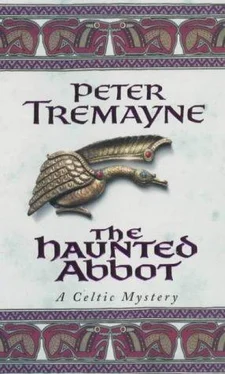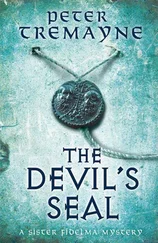Peter Tremayne - The Haunted Abbot
Здесь есть возможность читать онлайн «Peter Tremayne - The Haunted Abbot» весь текст электронной книги совершенно бесплатно (целиком полную версию без сокращений). В некоторых случаях можно слушать аудио, скачать через торрент в формате fb2 и присутствует краткое содержание. Жанр: Исторический детектив, на английском языке. Описание произведения, (предисловие) а так же отзывы посетителей доступны на портале библиотеки ЛибКат.
- Название:The Haunted Abbot
- Автор:
- Жанр:
- Год:неизвестен
- ISBN:нет данных
- Рейтинг книги:5 / 5. Голосов: 1
-
Избранное:Добавить в избранное
- Отзывы:
-
Ваша оценка:
- 100
- 1
- 2
- 3
- 4
- 5
The Haunted Abbot: краткое содержание, описание и аннотация
Предлагаем к чтению аннотацию, описание, краткое содержание или предисловие (зависит от того, что написал сам автор книги «The Haunted Abbot»). Если вы не нашли необходимую информацию о книге — напишите в комментариях, мы постараемся отыскать её.
The Haunted Abbot — читать онлайн бесплатно полную книгу (весь текст) целиком
Ниже представлен текст книги, разбитый по страницам. Система сохранения места последней прочитанной страницы, позволяет с удобством читать онлайн бесплатно книгу «The Haunted Abbot», без необходимости каждый раз заново искать на чём Вы остановились. Поставьте закладку, и сможете в любой момент перейти на страницу, на которой закончили чтение.
Интервал:
Закладка:
‘How did it change?’ asked Fidelma when he paused.
‘How? Cild arrived. I had never heard of Cild before, but when I visited the market in Seaxmund’s Ham, not long afterwards, someone told me that he had once been a warlord on the borders with Mercia. They told me that his father had disinherited him and so he had gone to a land called Connacht beyond the western sea. He had returned with a wife, a woman of your race.’ He nodded towards Fidelma.
‘You refer to Gélgeis?’
‘That was her name. Cild and Gélgeis came to the abbey when Cild became its abbot. Then I heard that Cild’s brother, a thane, had been disgraced. It was said that King Ealdwulf had refused to return Cild’s father’s titles and lands to the abbot.’
‘Go on.’
‘For a few months all was quiet and then I heard that Gélgeis had perished in the marshes near the abbey …’
‘Did you find out how?’
‘How?’ Mul was bemused for a moment. Then he shook his head. ‘I heard that Cild had become like a man possessed, driving out the religious who believed in the original rules of their Order and welcoming these new ideas from the Roman Rule of Canterbury. He slaughtered many who would not change theirways. He separated married clergy and sold the women into slavery. The abbey became closed to all women.’
‘You could have warned us about that,’ intervened Eadulf. ‘The night you drove us to the abbey, you could have warned us.’
‘You were religious intent on going to the abbey,’ replied Mul. ‘Why should I warn you? I am not a Christian nor have I any desire to become one if all you do is fight and argue among yourselves. Anyway, as I was saying, Cild showed that he was still a warlord. A few months ago he enticed into the abbey a band of young warriors who, dressed in the holy robes which you Christians adopt, would scour the countryside in search of loot. They raided this farm and it was then that I knew evil stalked the abbey.’
He fell silent for a moment or two as if contemplating the memory.
‘What happened?’ encouraged Fidelma softly.
Mul resumed his story, speaking in a studied voice as if to control his emotions.
‘I was away at market when they came. They came to loot. My wife and two young boys were here. In trying to protect what little I had, my wife was slain and the two children with her. I found their bodies outside when I returned. They are buried just beyond the barn.’
Eadulf coughed awkwardly. ‘How did you know that they were slain by the abbot’s men?’
Mul rose and turned to a cupboard. He opened it and took something from it, then returned to the table. He hesitated a moment and set it down on the board. It was a piece of bloodstained woollen cloth and a small metal crucifix on a silver chain.
‘That was clutched in my wife’s hand where she had ripped it from her assailant,’ Mul said quietly. ‘I knew then that it was the religious from Aldred’s Abbey who had paid me a visit that day. I will have my revenge on Cild, even if I have to wait ten years or ten times ten years. I have sworn this by the sword of Woden.’
‘When did this happen?’ Eadulf demanded.
‘Less than six months ago. Just at the time the young men appeared in the abbey, young fighting men.’
Fidelma had picked up the small crucifix, turning it over in her hands with her brows drawn together.
‘This is of Irish workmanship, not Saxon,’ she said softly after a moment or two.
Mul shrugged. ‘Many of the Christians are trained by your race, woman. Cild had been in this kingdom of Connacht. The provenance of the cross merely confirms what I say.’
She handed the cross to Eadulf without making further comment. It was a small, richly enamelled ornament on silver. It was, he observed, the type of rich jewel affected by the female laity rather than any member of the religious.
‘You say that this happened about six months ago?’ Fidelma was asking.
‘At the time of the summer solstice feasting,’ Mul muttered.
‘Tell me,’ Fidelma continued and again it seemed that she was changing the subject, ‘did you ever see Gélgeis, the abbot’s wife?’
He shook his head. ‘Not so far as I remember. I might have seen her from afar. I would not have known her to see, face to face. I was told once that she was pretty, with fair hair and features.’
‘Did you ever hear what manner of woman she was?’
‘What manner …?’ He paused and then grimaced dismissively. ‘She was married to Cild. Isn’t that enough? You are known by the company you keep and that goes for the partner you marry.’
‘You are a man of hard judgment, Mul,’ Eadulf sighed. ‘Sometimes it is only after marriage that you get to know a person.’
‘Did you ever hear a rumour that Cild murdered his wife?’ asked Fidelma.
Mul’s eyes widened a little and then he shook his head.
‘I only heard that she had wandered into Hob’s Mire. Many animals and several people have strayed into that bog and never returned. Perhaps her fate was a blessing for her.’
‘You said that you knew Brother Botulf?’ Fidelma pressed, ignoring his comment.
‘I did.’
‘Did you ever speak to him about Cild?’
‘After he was sent back to the abbey in disgrace, I hardlyever saw him. He was not allowed to go far from the abbey walls.’
‘What was this disgrace?’ asked Eadulf.
‘He supported Aldhere against the King.’
‘Why was that?’
‘I don’t know. Aldhere was of the same poisonous root as his brother. I heard that he sacrificed the King’s cousin during a battle when the Mercians invaded. Through his cowardice, King Ealdwulf’s cousin died. Botulf defended Aldhere for which stand the King ordered that he should return to Aldred’s Abbey, where he had been one of the brethren in the early days, and remain there, not leaving on pain of death.’
‘You imply that Aldhere was guilty. Does that mean that you thought Botulf was a liar?’ demanded Eadulf sullenly.
‘I would not know his reasons for defending Aldhere. Botulf was a good man, so far as I knew. Perhaps he was simply misguided. But I never had time to speak to him about the matter.’
‘Then how do you know that Aldhere is guilty?’ Eadulf asked.
‘Deeds not words!’ snapped Mul.
‘Explain that,’ Fidelma invited.
‘Simple enough. Ask anyone. Aldhere and his men are a band of robbers. They steal from everyone. They have also terrified and burnt the homes of many innocent people. Are these the actions of a good man who was not guilty of the accusation made against him?’
Fidelma sat back and sighed.
‘Well, it might be the actions of a man driven to find a means of survival. But burning the homes of the innocent is certainly not in keeping with the character of a man of principle.’
‘I say, a curse on both of them,’ Mul growled. ‘Religious brother or warrior brother; white dog, black dog, both are dogs.’
‘You may well be right. It does not help us get closer to the truth,’ Eadulf said in exasperation.
Mul turned to him with curiosity.
‘What truth are you seeking, gerefa ?’
‘The truth of who killed my friend Botulf.’
Mul sat back with a look of astonishment.
‘You did not tell me that Botulf was dead!’
Of course, Eadulf realised that Botulf had only been killed on the day Mul had dropped them at the abbey.
‘I’m sorry. He was bludgeoned to death in the abbey.’
‘I suppose the abbot was responsible,’ Mul muttered bitterly. ‘I felt that it was like putting a rabbit in with a run of ferrets … I mean, putting Botulf in Cild’s abbey when Botulf had defended his brother. Cild would obviously resent that.’
‘There is a logic in what you say,’ agreed Fidelma. ‘Do you know anything of the Irish religious in this area?’
Читать дальшеИнтервал:
Закладка:
Похожие книги на «The Haunted Abbot»
Представляем Вашему вниманию похожие книги на «The Haunted Abbot» списком для выбора. Мы отобрали схожую по названию и смыслу литературу в надежде предоставить читателям больше вариантов отыскать новые, интересные, ещё непрочитанные произведения.
Обсуждение, отзывы о книге «The Haunted Abbot» и просто собственные мнения читателей. Оставьте ваши комментарии, напишите, что Вы думаете о произведении, его смысле или главных героях. Укажите что конкретно понравилось, а что нет, и почему Вы так считаете.











